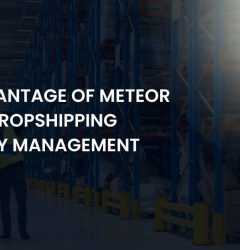09 Nov

Table Of Contents:
- What Is Peak Season In Ecommerce?
- What Are Peak Season Ecommerce Returns?
- Problems Caused By Peak Season Ecommerce Returns For Businesses
- Problems Caused By Peak Season Ecommerce Returns For Customers
- The Importance Of A Robust Ecommerce Returns Strategy
- Preparing Yourself For The Peak Season Ecommerce Returns
- Team Up With Meteor Space For An Excellent Peak Season Ecommerce Returns Strategy
- Peak Season Ecommerce Returns FAQs
What Is Peak Season In Ecommerce?
For ecommerce businesses, the peak season occurs in the fourth quarter of the year. A large majority of sales for an ecommerce business takes place during the last three months of the year. Ecommerce businesses benefit from the sales brought to them by Christmas, Black Friday, and Cyber Monday.
People all across the world are purchasing items for themselves and their loved ones during this time, giving a great boost to ecommerce businesses around the globe. However, with the increased amount of sales comes an increased amount of ecommerce returns. There are many reasons why an item is returned to an ecommerce business.
During the peak season, one of the major returns are gifts and presents. The peak season in ecommerce can cause a lot of disruptions in a business’ supply chain, fulfillment, and shipping. To make sure that your business does not face any of these issues, you must have robust ecommerce returns strategies in place, helping you navigate the increased amount of sales and returns with ease.
What Are Peak Season Ecommerce Returns?
Peak season ecommerce returns are the returns made to an ecommerce business during the peak season or after it. These returns are brought on by the increased amount of sales made by an ecommerce business during the peak seasons. For example, if an ecommerce business is selling more during the Christmas season, they might also have to deal with a larger amount of returns in January.
According to a survey carried out by leading ecommerce platform, Shopify, ecommerce businesses reported that around 80% of the returns they receive are in January. These returns are peak season ecommerce returns. There are various problems that can be caused due to high peak season ecommerce returns for both, the business and the customers.
Taking the appropriate steps and implementing the right ecommerce returns strategies can help you avoid these issues and maintain an excellent overall experience for your customers. Working with the right 3PL companies, like Meteor Space, that can help you manage your peak season ecommerce returns seamlessly can be a huge benefit for you and your business!
Problems Caused By Peak Season Ecommerce Returns For Businesses
Trouble Maintaining Customer Loyalty And Longevity
When it comes to eCommerce, a business needs to provide the best customer service and create an enjoyable experience for all their audience. Ecommerce businesses usually operate with a “customer is always right” approach, which can be challenging to maintain when it comes to dealing with eCommerce returns.
According to an ECR report, ecommerce businesses have a lot of trouble balancing between keeping their customers happy and avoiding financial loss, especially during peak seasons. When it comes to peak season ecommerce returns, online businesses are stretched thin trying to prevent their losses while trying to manage returns.
It is crucial that ecommerce businesses forget about making a profit and maintain their lenient returns policies in order to keep their customers satisfied with them and improve their overall brand reputation. This can end up causing problems for online businesses and brands.
Extra Expenses And Costs
Ecommerce returns management is not an easy process. You need extra storage space, more workers, and an advanced system to track all inventory and returned orders. All of this can bring more expenses for your business. During peak seasons, these costs and expenses are bound to increase even more as the return rate also increases.
As a leading ecommerce business, you have to invest in various areas and hire an expert group of workers that can help you with your peak season ecommerce returns management. Ecommerce businesses are usually looking for ways to lower their expenses. However, returns and their management can lead to an unexpected increase in expenses, especially during the peak seasons.
Difficult To Track
Ecommerce businesses all over the world use various sales and fulfillment strategies. Some businesses go back and forth between multichannel and omnichannel strategies and have to maintain their inventory and manage order fulfillment for numerous channels. Ecommerce businesses that use multiple sales channels also have to prepare to manage returns from all the separate channels.
This is not easy. During peak season, your ecommerce sales from all channels are bound to increase and with that, there is a rise in the return rate for each channel. It can become difficult to track all returned orders on all different platforms. As an ecommerce business, you must find a management system or software that can help you track all orders from all your sales channels in one place!
Problems Caused By Peak Season Ecommerce Returns For Customers
Strict Ecommerce Returns Policies
Ecommerce businesses are not the only ones that have to face problems caused by the increased return rates during peak seasons. When businesses have to take steps to manage the returns and develop policies that can help them out during peak seasons, customers end up having to deal with the problems caused.
For example, an ecommerce business can end up making their returns policy stricter during the peak season to make sure they are not overburdened with returns. This can prevent any return fraud but also at the same time, it can lead to problems for the customers who have received any erroneous orders and want to return the items.
Fewer First Time Resolutions (FTRs)
During peak seasons, the ecommerce returns are at an all time high. This means that the ecommerce businesses are usually struggling to get back to each customer and resolve their queries and issues, especially regarding returns. The ecommerce businesses are overburdened with customer questions and queries, which is why resolving everything for everyone can be a challenge.
Peak seasons ecommerce returns can cause a decrease in first time resolutions (FTRs) for businesses. There is a massive build up of returns and communications with the ecommerce business’ customer support team are usually dealing with a lot of backlog. This can cause a huge problem for customers that are looking for a quick solution, especially during peak seasons.
Increased Costs
There are many ecommerce businesses that come up with techniques like increasing return costs and return shipping charges for their customers in order to combat returns fraud during the peak season. However, this can lead to more problems for the customers.
It is understandable that ecommerce businesses decide to increase their costs associated with returns because they have to prevent financial loss for their business. However, customers that have a genuine reason to return the items are faced with more challenges with returning their products.
The Importance Of A Robust Ecommerce Returns Strategy
Having a strong ecommerce returns policy is essential for the success of your online business. Compared to every other sector, ecommerce requires you to have a robust returns policy in place for multiple reasons. Your customers are essentially placing orders from your online store without seeing the product in person, which is a huge risk for them. If they cannot return the product if it doesn’t live up to their expectations, they are less likely to come to your business again. Let’s take a closer look at why your ecommerce returns strategy is crucial for your business.
Customer Satisfaction
As we already talked about above, your returns policy plays a massive role in your business’ customer satisfaction and retention levels. When your customers are purchasing from your online store, they are ordering products without trying them out or seeing them in person. This leads to higher chances of them wanting to return their orders.
If it is not easy for them to make ecommerce returns, their satisfaction levels will go down and they will not have the best experience with your ecommerce business. Having an underwhelming returns experience also means that they will be less likely to come back to your online store to shop from you again. Having an ecommerce returns policy that favours your customers is a huge benefit for your business in the long run.
Loyalty To Your Brand
Your ecommerce returns policy plays a huge part in the experience your customers have when buying from you. If they have a good experience, they are going to return to your online store more often and it can be easier for you to retain your customers. A strong ecommerce returns policy is an excellent way for you to retain your customers.
Through your ecommerce returns process, you can provide the best service for your customers and improve your overall brand reputation. It helps you increase your customers’ loyalty to your brand and creates an impressive image for your online store. If your ecommerce returns policy is satisfactory, you are more likely to increase your online store ratings and receive better reviews.
Increase Your Sales
When your customers are satisfied with the service they receive and their ecommerce returns experience, they are going to come to your store to shop more often. You will also receive better reviews and it will improve your overall sales.
Many ecommerce brands don’t realise but their ecommerce returns strategy is an excellent tool to grow their brand and improve their end results. Your ecommerce returns don’t have to end up draining your revenue, as the service you provide can also lead to you bringing in more sales at the end of the day.
Preparing Yourself For Peak Season Ecommerce Return
Get Your Accurate Forecasts
Forecasting plays a massive role when it comes to being prepared for the eCommerce peak season. You need to use all the data and information available to generate accurate forecasts through advanced software systems. Your forecasts not only help with being prepared for sales during peak season, but they can also help you out with your returns management.
When you create inventory forecasts, you get an idea of which products are going to be the most in-demand during peak season and you prepare your inventory according to that. It is also important to keep in mind that the products that you sell the most during peak season are also most likely going to be the ones that get returned most often. You should prepare your inventory to deal with the sales as well as the returns using your forecasts.
Focus On Adding Returns Back To Your Inventory
It is crucial that your returned items are added back to your inventory as quickly as possible. If you cannot add the returned items back to your stock, you can end up losing out on profit and drain your revenue. As an ecommerce business, it is important that you have a strategy in place, especially during the ecommerce peak season, that helps you manage the returned items efficiently.
It is a well-known fact that handling returned items can take a lot of time and labour. You have to check every item that is returned, fix any issues that might be present, and add it back to your inventory after processing it. You can also take help from an experienced 3PL and outsource your fulfillment to them. When they handle your fulfillment, they also manage your returns for you and you don’t have to worry about spending extra time on returns during peak season.
Have An Ideal Returns Location
There are many businesses all over the world that use a specific location for their returns, and during peak season, this can be extremely helpful for you and streamline all your returns processes. If you allow your customers to return items by shipping them back to you, it can be convenient for them but it can cause a lot of problems for you.
Getting all returned items shipped back to you or your warehouse during peak season is challenging. It is difficult to track all returns as well as the orders that you are shipping out to customers, all at once. If you have a designated location for your returns, your customers can drop their returned items off and carry out their exchanges or refunds at the spot. This helps you stay organised during the hassle of peak season.

Your Fulfillment Strategies Should Be Return-Friendly
When you develop your ecommerce fulfillment strategy, it is crucial that you keep the peak season in mind. You should know what to expect during the ecommerce peak season regarding sales and returns. As an ecommerce business, you should keep all your fulfillment strategies return-friendly.
This will help you keep your customers satisfied and happy with your service. It also helps you streamline your peak season ecommerce returns and manage everything better. Keeping your returns in mind when developing your strategies can help you prevent the build up of customer queries during peak season and enable you to resolve their problems better.
Try To Avoid Returns Overall
Before anything else, you should try to prevent orders being returned to your store at all costs. As an ecommerce business, you can maintain a high level of customer satisfaction and avoid extra expenses if you take all the right steps to avoid having orders returned. There are various steps you can take that can help you lower your return rate.
For example, you should make sure that all orders are packed securely using the highest quality packaging materials. This will prevent any damage being caused to the orders during shipping. You should also make sure that no accidents take place in your warehouse and all items are kept protected.
Double checking all orders during picking and packing can also help you make sure that all customers get correct orders and there is a less chance of the items getting returned. You can also add the option for 3D visualisation and AR technology on your ecommerce website. This way, your customers can order after getting a better look at the products.
Team Up With Meteor Space For An Excellent Peak Season Ecommerce Returns Strategy
Developing an excellent peak season ecommerce returns strategy is not an easy task. There are numerous factors that you have to consider when it comes to your returns strategy and policy, and doing it all on your own can be challenging.
Which is why Meteor Space is here to help! As one of the leading 3PL fulfillment companies, we provide a complete solution for all your order fulfillment needs, including managing the reverse logistics for your ecommerce business. We have years of experience when it comes to managing returns for ecommerce businesses, and we can develop a returns strategy that is best suited for your business and customers.
With our help, you can focus on other aspects of your business without having to worry about how your fulfillment and returns are carried out. We aim to provide the best possible experience for your customers and our ecommerce returns management can help keep your customers happy!
Want to find out more?
Peak Season Ecommerce Returns FAQs
Peak season in ecommerce is the season when a business receives the most orders and makes the highest number of sales. According to a survey carried out by Shopify, the peak season for a vast majority of ecommerce businesses is the fourth quarter of the year. During these months, ecommerce businesses make more sales and they also have to deal with a higher number of ecommerce returns.
A solid ecommerce returns strategy is essential for all online businesses. It helps you organise and streamline all your ecommerce returns processes and keep your customers happy with the experience they have when shopping from your online store. By optimising your ecommerce returns strategy, you can improve your customer loyalty towards your brand.
There are many reasons why customers end up returning ecommerce orders. The most common factor is that ecommerce purchases are made online without your customers ever touching or seeing the products in real-time. This often leads to the products being different than what the customers expected and they end up returning the orders. The difference in size, material, colour, etc., are also prominent reasons why some ecommerce returns are made.
Meteor Space is one of the leading 3PL fulfillment companies. We offer a complete set of fulfillment services, including ecommerce returns management. Meteor Space can help develop an excellent ecommerce returns strategy and policy for your business and keep your customers happy with the returns services we provide to them on your behalf.


